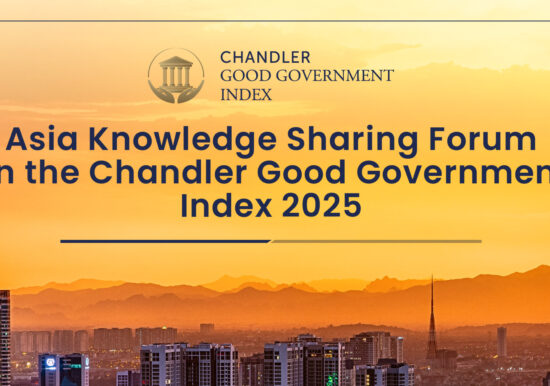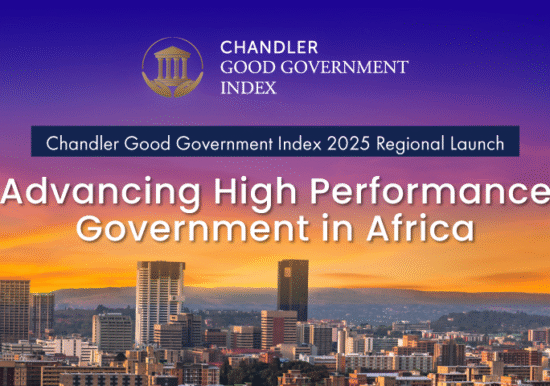
The Rule of Law: A Foundational Element of Good Government
Alejandro Ponce
Chief Research Officer, The World Justice Project
What is the “rule of law” and why is it so important for good governance? In this essay, Dr Alejandro Ponce of the World Justice Project (WJP) Rule of Law Index® explains how the concept can be understood and measured. The CGGI uses the Rule of Law Index as the primary metric of countries’ performance in this area. Dr Ponce discusses the challenges governments face, and how good use of data can support the rule of law. More information and details can be found at www.worldjusticeproject.org.
The Rule of Law is the systematic compliance of both citizens and authorities with the law and its application, in a manner that is effective, consistent, impersonal, and upholds human rights. It is internationally recognized as a principle necessary to guarantee peace and justice and to encourage investment and economic development. The rule of law provides a foundation for good government and prosperous societies, and as such, it is an important dimension of any measurement of good government.
What is the Rule of Law?
The rule of law has long been considered central to various goals, including justice, development and democracy. And yet, despite its prominence as a conceptual ideal, there is little agreement as to what constitutes the rule of law and how to best advance it. Against this backdrop, the World Justice Project (WJP), an independent multi-disciplinary organization, developed a theoretical framework and a set of indicators for assessing the extent to which countries adhere to the rule of law in practice. These indicators constitute the backbone of the WJP Rule of Law Index® and build on previous research and literature on the nature of the rule of law.
The Index builds on the observation that all states have legal frameworks to organize the behavior of individuals, organizations, and authorities, who decide to comply with the law, or apply it based on these legal and institutional frameworks and power asymmetries. The law imposes limits on the exercise of power by the state and its agents. In turn, the state limits the actions of members of society and fulfills its basic duties toward its population in accordance with the law, so that the public interest is served, people are protected from violence, and all members of society have access to dispute settlement and grievance mechanisms (See https://worldjusticeproject.org/about-us/overview/what-rule-law for a more detailed definition).
The WJP Rule of Law Index® embodies these ideas within a simple framework, operationalized through a comprehensive and multi-dimensional set of outcome indicators organized across eight dimensions: constraints on government powers, absence of corruption, open government, fundamental rights, order and security, regulatory enforcement, civil justice, and criminal justice. These outcomes encompass, for example, whether people have access to court, whether authorities adhere to due process in criminal proceedings, and whether corruption is effectively controlled.

To portray the rule of law as experienced by ordinary people, the WJP calculates the Index scores using a large number of questions drawn from two original data sources collected by WJP in each country or jurisdiction: a General Population Poll (GPP) and a series of Qualified Respondents’ Questionnaires (QRQs). These data sources capture the experiences and perceptions of citizens and professionals of the performance of the state and its agents and the actual operation of the legal framework in their country or jurisdiction. This is the most comprehensive global dataset of its kind. (See a detailed explanation of the methodology in a paper published on the WJP website, at https://worldjusticeproject.org/our-work/publications/working-papers/measuring-rule-law.)
The scores and rankings in the WJP Rule of Law Index 2020 were derived from more than 130,000 household surveys and 4,000 legal practitioner and expert surveys in 128 countries. Together, they provide a basis for cross-jurisdictional and longitudinal analysis by policy makers and citizens to better develop and promote reforms.
The Rule of Law Matters
The rule of law influences our everyday lives. Indeed, most scholars and policy-makers in recent years have viewed the rule of law as an instrument for achieving socio-economic development goals, and as an end in itself. This is exemplified by Goal 16 of the United Nation’s Sustainable Development Goals (SDGs), which establishes the rule of law as being vital to sustainable development. In the words of the United Nations Development Program, the rule of law is a ‘critical instrument for promoting social cohesion, preventing conflict and ensuring inclusive, safe and peaceful societies.’Intrinsically, the rule of law guarantees public safety, legal security, respect for human rights, access to justice, and accountability. Instrumentally, the rule of law promotes investment by improving the business environment, which increases the expected return on investment. It encourages the efficient use of public and private resources, by promoting competition and encouraging investment in public goods such as health, education and infrastructure. It also supports human development by promoting the peaceful resolution of conflicts, combating violence, and redressing grievances.

The data supports these ideas. In cross-country analyses, the rule of law correlates with higher economic growth, greater peace, less inequality, improved public health, and more education. Generally, the stronger the rule of law, the better the outcomes across a range of measures of various economic and social goals. (See Figure # for an illustration of the relationship between the rule of law, as measured in the WJP Index, and Gross Domestic Product.) While this analysis is correlational and does not prove causation, it is clear and consistent with other, more robust, studies. These linkages have motivated policy-makers, scholars, and decision-makers in a range of public and private institutions across the globe to take note and work to identify effective strategies to strengthen the rule of law.
The challenges of strengthening the rule of law
Despite the growing appreciation for the importance of the rule of law, very few countries have been able to establish institutional settings in which citizens and authorities comply systematically with the laws, and authorities enforce them effectively, systematically, impersonally and in a rights-respecting manner across multiple areas and spheres of action of the law.
In the 2020 edition of the WJP Rule of Law Index®, on a scale of 0 to 1, only 23 countries out of 128 attained a score greater than 0.7. In the same way, few countries have been able to make steady progress on their rule of law scores.Only 9% of countries improved their overall score more than 2% over the previous year, and only 2% improved, on average, more than 2% over the last 5 years. Indeed, in the last two years, the rule of law has been in decline globally. The 2020 WJP Rule of Law Index® reported more countries’ scores declining than improving for the third year in a row, with the steepest declines in the factors that measure constraints on government powers, absence of corruption, and fundamental rights.
The negative trend holds in all corners of the world, with the majority of countries in every region either declining or remaining the same in their Index score between 2019 and 2020. These trends are likely to continue in light of the challenges posed by the COVID-19 pandemic such as weak compliance and accountability mechanisms, discrimination, and difficulties accessing the justice system.
While different countries face different rule of law challenges, most of them derive, in one way or another, from exclusive institutional arrangements, lack of capacity, and a dearth of incentives for political actors to generate substantial change, all of which makes change difficult. In fact, the vast majority of countries experience an ebb and flow in rule of law, with progress coming slowly, in small increments. Often the countries that experience the largest gains in the WJP Rule of Law Index one year subsequently see significant declines, when a government’s inconstant commitment to reform erodes its past progress.
In spite of this, a few countries have been able to strengthen the rule of law in recent years. In all these cases, the common denominator was the construction of social and political support for reforms grounded on causes that were sufficiently important to overcome opposition from entrenched forces and to modify beliefs and behaviors of people both in government and the general public. These movements require effective leadership, the participation and commitment of different parts of society to design, implement and sustain reforms, and a strong evidence base.
In cross-country analyses, the rule of law correlates with higher economic growth, greater peace, less inequality, improved public health, and more education. Generally, the stronger the rule of law, the better the outcomes across a range of measures of various economic and social goals.
Alejandro Ponce, Chief Research Officer, The World Justice Project
Using Data to Strengthen the Rule of Law
Indeed, data and indicators can be invaluable to reform efforts, providing policy-makers with essential evidence, inspiration and insight to strengthen the rule of law. Cross-country indicators, in particular, can serve as diagnostic tools for stakeholders to identify trends, stress strengths and shortcomings, and draw attention to issues. This information helps practitioners solidify a country’s intuitive grasp of known problems and complement their personal experiences with systematic data. This not only forms the basis of a more complete assessment, but also empowers policy makers with information to support arguments, raise the profile of important questions, and build pressure to advance the rule of law. Indicators are also useful in monitoring the progress of reform by tracking institutions, inputs, and outcomes over time, and as they are affected by new policies and events.
Data collection is not an end in itself and it certainly has limitations, but more quality information can help in advancing social outcomes. The WJP Rule of Law Index has stimulated and supported rule of law reform in each of these ways. We hope that those who use it as part of the Chandler Good Government Index will find it helpful in building the rule of law as a foundation for good government and that in future years, we will measure their progress and look to it as a model for others.
More Stories


Watch the Chandler Good Government Index 2025 Regional Launch

